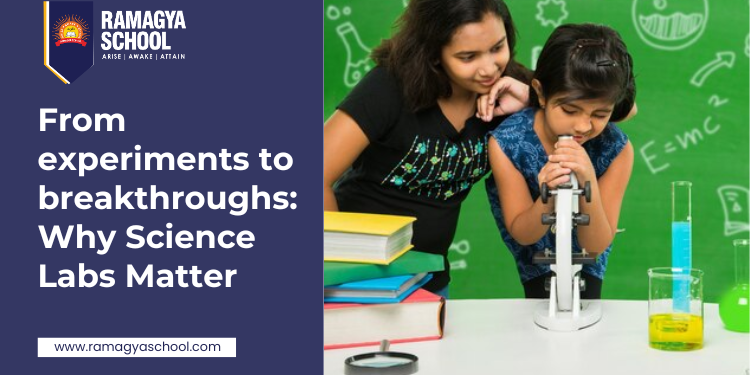Science isn’t just the study of books and learning facts. It’s about observing the possibilities of experimentation, understanding, and the way things function on the ground. Imagine a space where you can discover the mysteries of chemistry, biology, and physics with a real-time experience. A place where theory and practice meet.
Why Science Labs Matter?
The science labs in school can be described as playgrounds designed for children with an interest. They offer a safe space where students can perform experiments, make observations and draw their own conclusions. This type of hands-on learning is vital because it helps students understand difficult concepts better than reading a book.
What are the Components of Science Labs?
The science labs in schools are outfitted with the latest technology and tools to aid in the learning process:
- Biology Lab: Here, students study living organisms as well as biological processes. Students use microscopes to study cells, make dissections to study anatomy, and carry out experiments to study the ecology and genetics of an ecosystem.
- Chemistry Lab: In the laboratory for chemistry, students discover the world of chemicals and their reactions. They carry out experiments to learn about the chemical bonding process acids and bases and even make compounds. Safety is the top priority that is why they have the right respiration and equipment for safety.
- Physics Lab: The physics lab is where students dig into the mechanics of electricity, motion, and magnetism. They carry out experiments using circuits, pendulums and optics to make theoretical concepts take on life.
Learning Through Experimentation
The labs teach us primarily about doing. The following are the ways students get the most benefit:
- Practical Experience: Instead of watching lectures, the students take part in the activities. This hands-on approach aids them in retaining concepts and grasp their practical applications.
- Critical Thinking: By conceiving experiments and analyzing the results, students build critical thinking abilities. They are taught to ask questions about how they think, formulate hypotheses and draw inferences–a key element of scientific inquiry.
- Skills for Problem Solving: If experiments don’t go according to plan Students learn how to fix the problem and adjust, a skill that is useful in everyday life and science.
Safety First
Safety should be a top priority for a laboratory. Students are taught the safety guidelines for labs prior to conducting any experiment. They wear safety glasses or aprons as well as gloves when needed. The handling of chemicals is handled carefully and waste disposal is conducted according to strict guidelines to safeguard students and the environment.
The role of Teachers
Our highly skilled teachers are essential in helping students navigate their laboratory learning experiences:
- Facilitation: Teachers assist students in learning through explanation of concepts, showing methods, and leading students through their own experiments.
- Support: They offer encouragement and assistance in helping students overcome difficulties and enticing them to pursue their interests in science.
- Mentorship: Teachers act as mentors, energizing students to pursue careers in science, and aiding them in their learning journeys.
Real-World Applications
The science lab experience extends beyond the classroom
- Career Preparation: Practical laboratory experience helps students prepare for careers in the field of engineering, science, technology and mathematics (STEM). It offers them an insight into the everyday routine of researchers and scientists.
- Innovation and Creativity: Labs foster creativity and innovation. Students might discover innovative methods to solve problems or create ideas that may result in technological breakthroughs.
Success Stories
A lot of kids have pursued career paths that have been successful in a variety of scientific fields. Their journey began in our laboratories, where they were able to develop enthusiasm for research and the foundation of the science of.
Community Engagement
Our labs aren’t just for students. They are also open to the public. We organize workshops, science fairs and demonstrations that will inspire the next generation of scientists and inform the general people about the fascinating world of science.
Future Enhancements
As technology advances, so do our labs. We’re committed to constantly updating our facilities and incorporating the latest equipment and methods to keep up with the latest scientific advances.
Explore Ramagya School’s Inspiring Science Labs
The Science labs at Ramagya School are designed to ignite interest and encourage active learning equipped with the latest tools and technologies. Every lab — biology along with physics, chemistry, and biology — provides an exciting setting for students to investigate the concepts of science in a practical way.
- Biology labs allow students to study microscopic creatures and conduct dissections to learn about anatomy.
- Chemistry labs provide opportunities to mix chemicals in a safe manner and to experience reactions for the first time.
- The physics laboratory students explore electric forces, electrical energy and light with specialized equipment.
Safety is the top priority, thanks to well-trained staff and strict guidelines implemented. Our labs do not just aid in academic learning, but also encourage inquiry, problem-solving and prepare students for careers in science.
Through engaging and motivating experiments, as well as the direction from teachers, the Ramagya School’s science labs encourage students to be enthralled by the possibilities of science and use their knowledge in new ways.
Conclusion
Science labs in schools are much more than labs with equipment. They are places where students are inspired, their knowledge is developed, and the next generation of researchers are born. Our state-of-the-art labs for science we’re committed to fostering the future generation of innovators and problem-solvers.
Through hands-on experiments as well as critical thinking and mentoring, we train students to meet the challenges of the future and contribute meaningfully to the world. Begin with us for this adventure of discovery and exploration. This is where practice meets theory and where dreams are realized!





